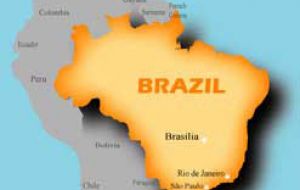MercoPress. South Atlantic News Agency
Brazil leaves rates unchanged confident of non-inflationary recovery
 Latinamerica’s biggest economy is responding to the stimulus programs
Latinamerica’s biggest economy is responding to the stimulus programs Brazil's Central Bank decided on Wednesday to keep its benchmark lending rate unchanged at a record low 8.75%. The monetary policy committee, Copom, voted unanimously to leave the so-called Selic rate steady, in line with analysts' expectations.
Following its two-day monetary policy meeting Copom said that “taking into account the prospects for inflation relative to the trajectory of the targets, Copom decided to keep the Selic rate unchanged at 8.75%, with no bias, unanimously”.
“Taking into account, on one hand, the easing of monetary policy implemented since January and, on the other hand, the factory capacity gap among other factors, the committee believes that this level is consistent with a benign inflation scenario, contributing to ensure the maintenance of inflation within the targets throughout the relevant time horizon and for the non-inflationary recovery of economic activity”.
The statement is almost identically to the previous July 22 decision, helping ensure inflation stays near the Central bank’s target of 4.5%, plus or minus two percentage points.
Latinamerica’s biggest economy is rebounding from its first recession since 2003, powered by local demand. Industrial production expanded in the past seven months, companies resumed hiring and retail sales have returned to pre-crisis levels. GDP, after contracting in the last quarter of 2008 and first quarter this year, is expected to grow 1.5% in the second quarter from the first quarter, according to local analysts.
Some financial circles believe the Central bank will keep rates unchanged through the end of 2010 as there is little chance of stoking inflation while economic growth recovers gradually.
However traders expect interest rates to rise to 9.4% by April 2010, according to estimates based on overnight interest rate-futures contracts, even as inflation is forecast to remain below the government’s target until 2011, according to a Central Bank survey.
Industrial output rose 2.2% in July from June, its biggest gain in more than a year, as lower rates, tax cuts and increased government spending helped stimulate activity. GDP may shrink 0.3% this year before rising 4% in 2010, according to the Central Bank survey of economists taken August 28.
Annual inflation, as measured by Brazil’s IPCA index, slowed to 4.5% in July, the lowest since December 2007 and compared with 5.8% in January. The IGP-M price index, a gauge of wholesale prices by which costs for home rentals and utility rates are adjusted, turned negative in July for the first time since 2006.
The Central Bank slashed the benchmark interest rate from a two- year high of 13.75% in January and injected about 100 billion US dollars into money and currency markets to boost loans to companies and consumers amid the global credit crunch.
The government has also lowered taxes on cars and electronics pushing retail sales.




Top Comments
Disclaimer & comment rulesCommenting for this story is now closed.
If you have a Facebook account, become a fan and comment on our Facebook Page!